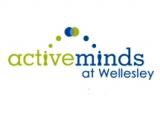This past Monday, Oct. 3, Active Minds chapters across the country celebrated National Day Without Stigma. The Active Minds website states that the goal of the day is “to eliminate the shame and discrimination surrounding mental health disorders by creating communities of understanding, support, and help-seeking.” In essence, Day without Stigma embodies the mission of Active Minds as a whole.
Walking around campus, you might have noticed chalk messages about mental health, like “stigma is silence” and “love is louder” on sidewalks. You also might have been a part of our a Day Without Stigma table at Lulu. Our table featured posters, flyers and activities aimed at reaffirming Wellesley’s dedication to combating the stigma surrounding mental health concerns. Here, visitors were invited to sign a poster that read “I Pledge to Fight Mental Health Stigma” or fill out a paper heart answering the prompt “If someone tells me they have a mental illness, I will say…” Students could pick up a number of flyers, including “How to Reduce Stigma” and “Get to Know the Stone Center Counselors.” This year we also demonstrated MyWellesley’s Mental Health Online Screening Program.
Students can access this screening questionnaire through the MyWellesley Administrivia tab under “Especially for Students.” The screening begins by asking the user to choose a statement that describes how they’ve been feeling lately. Statements range from “troubled by traumatic events” to “worried about my drinking habits.” Aiming to determine whether students’ concerns necessitate further treatment, the screening concludes with helpful information about where to find resources on campus should they be necessary. You can take the survey as many times as you would like, and your responses are completely anonymous. Robin, the Director of the Stone Center just gets an update periodically with information about how many students have taken the screening. Your answers and results are completely anonymous. The results of the surveys do not diagnose people with a specific concern they just give people an idea of what they can mention to a counselor. Some people print off their results and bring it to the Stone Center. The screening tool is a great resource to refer your friends to and to check out yourself.
Of course, any Wellesley student can go to the Stone Center without having a “diagnosable mental illness.” Even if you take the screening and everything seems fine, you can still go. You could think about it this way: chances are you’ll never get access to free therapy after Wellesley. Take advantage of it now!
Talking about the screening tool, National Day Without Stigma and even the fact that you read this column today are all ways to reduce mental health stigma on campus. Sometimes just starting the conversation about mental health can be a big step for helping people around you. Mental health stigma can make people stay silent about mental health concerns. In this way, mental health stigma silences us when we need help the most.
Here’s a list of things that you could do to reduce mental health stigma on campus:
– Talk openly about mental health, mental health disorders and treatment.
– Educate yourself about mental health. Encourage others to do the same.
– Think carefully about your language.
Try not to use words like “psycho” or “lunatic.” These words can paint a stereotypical, misguided and hurtful image about mental illness. Of course, people feel differently about word uses.
– Recognize and respect the difference between disorders and other behavior.
For example, when people say that they’re “OCD” because they prefer to keep their room clean, they paint a different image of mental illness one that’s rooted in mental illness being silly or something that people can just “get over,” rather than the truth.
– Focus on the person, not the illness.
Approach people with mental health conditions with respect, dignity and love.
– Challenge media representations of mental health disorders.
When you see something that looks wrong, speak up! You could say something like, “Wow, I wish the director would have taken my abnormal psychology class. Maybe that would have been a little less ridiculous.”
– Push back against stereotypes or oversimplifications of mental health disorders.
Focusing on facts can help. For example, you could say something like, “I get why you might think that, but I learned that the truth is …”
– Treat mental health illnesses like you would physical injuries and illnesses. Invite others to do the same.
Encourage people to reach out to resources, rather than suggest they focus on trying to get over whatever they’re experiencing.
We hope that National Day Without Stigma inspired you to be a stigma fighter every day.
Stone Center number: 781-283-2839
Active Minds email: [email protected]




